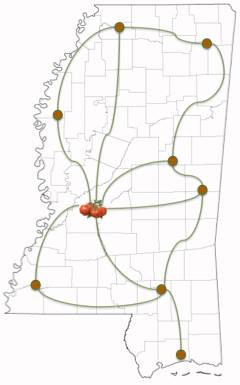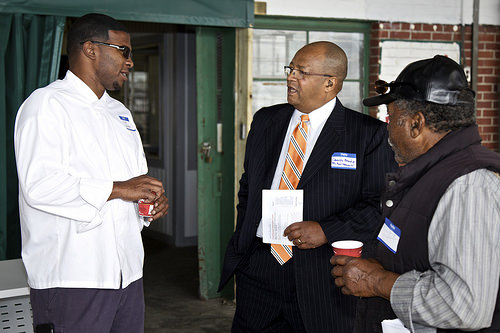 In 2014 a group of restaurant owners and chefs came together to create Soul City Hospitality, which brings local, Mississippi-grown produce to the state’s restaurants, grocery stores, schools, and farmers markets in order to support Mississippi agriculture and create a culture of health through locally-sourced natural ingredients.
In 2014 a group of restaurant owners and chefs came together to create Soul City Hospitality, which brings local, Mississippi-grown produce to the state’s restaurants, grocery stores, schools, and farmers markets in order to support Mississippi agriculture and create a culture of health through locally-sourced natural ingredients.
Challenge
Prior to the creation of the Up in Farms Food Hub at the heart of Soul City Hospitality’s Locally Invested Food Trade program, farmers had to travel to multiple locations all across the state in order to sell their produce. This meant taking away from valuable farming time, driving up costs of travel expenses, selling what they could (and often nothing at all) to farmer’s markets, stores, or even on their own on the side of the road. It was an ineffective system that didn’t guarantee local produce was getting to the table of Mississippians. And, often, food went to waste.
Solution
The Locally Invested Food Trade Solution was to create a centrally located “Food Hub” in Jackson. The Food Hub, located next to the Jackson Farmer’s Market, essentially solved the problems farmers faced when trying to sell their produce. It reduced travel times because now farmers only had to travel to one central location. It guaranteed buyers for their produce. It increased time to get back to farming, and it kept local produce in state, providing healthy food sources for Mississippians and reducing waste.
Results
Locally grown produce stayed local and went to Mississippi’s restaurants, stores, and schools. The Food Hub created a resilient and sustainable food system, brought better, seasonal produce to MS schools, contributed to the growth of the Mississippi farming and agricultural sector, and ultimately helped to create a culture of health for Mississippians of all ages while aiding to a strengthened agricultural economy.
Sustainable Success
As the LIFT program continues to grow, the Food Hub model can be applied to regions all across the state so that farmers far from the Capital City can travel to their nearest hub. These hubs can support the local restaurants, schools and other buyers, making Mississippi’s food systems even more localized. This will also allow farmers to connect one-on-one with business owners, which will strengthen the relationship between our agricultural and business sectors. As these two sectors begin to work together more and more, not only do they benefit from each other, they also solve a pressing social issue which will help to create a culture of health for all Mississippians.

